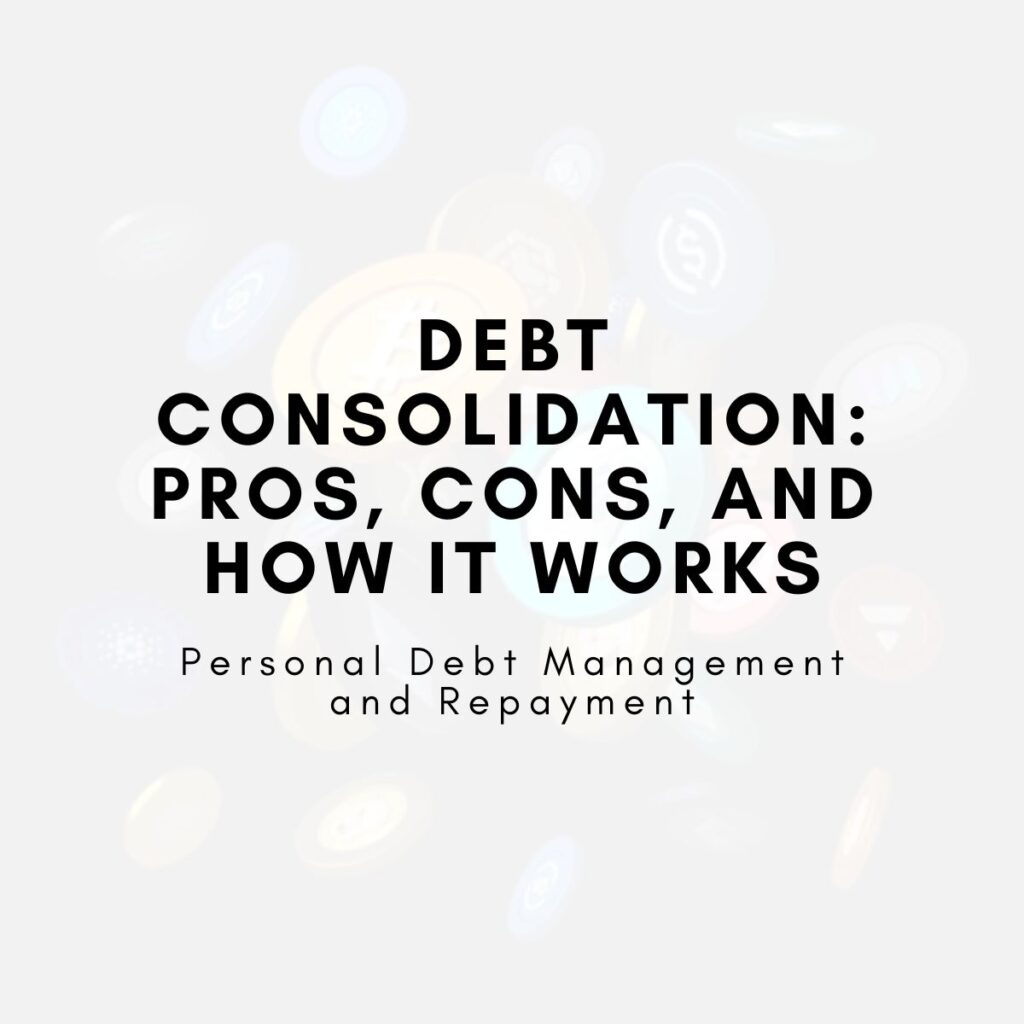
What is debt consolidation and how does it work?
Debt consolidation is a financial strategy that combines multiple debts into one loan with a lower interest rate. It can simplify your finances, lower monthly payments, and make it easier to manage your debt. In this guide, we’ll explore the pros and cons of debt consolidation, how it works, and when it’s the right choice for you.
Summary Table: Debt Consolidation: Pros, Cons, and How It Works
| Topic | Details | Example |
|---|---|---|
| What is Debt Consolidation? | Combining multiple high-interest debts into one loan with a lower interest rate. | A $10,000 credit card balance at 22% interest is consolidated into a loan with a 10% interest rate. |
| Types of Debt Consolidation | 1. Debt Consolidation Loans: Personal loans for consolidating debts. 2. Balance Transfer Cards: Transfer high-interest credit card balances to a new card with 0% APR. 3. Home Equity Loans / HELOCs: Borrowing against your home’s equity. | A personal loan consolidates $8,000 in credit card debt at 12% APR into one loan. A 0% APR card transfers a $5,000 credit card balance. |
| Pros of Debt Consolidation | 1. Lower interest rates. 2. Simplified finances with one monthly payment. 3. Fixed monthly payments. 4. Potential for improved credit score. 5. Avoiding bankruptcy. | Lower interest rates like 6% instead of 20% on credit cards, making it easier to pay down debt. |
| Cons of Debt Consolidation | 1. Risk of accumulating new debt. 2. Fees and charges (e.g., origination or balance transfer fees). 3. Longer repayment period, which can increase total interest. 4. Secured loans put assets at risk. 5. Temporary impact on credit score. | If you consolidate with a secured loan, you risk losing your home if you default. |
| When Is Debt Consolidation a Good Option? | 1. High-interest debt. 2. Multiple debts with different due dates. 3. Steady income. 4. Commitment to not accumulating new debt. | Consolidating $15,000 in credit card debt with 18% APR into a 10% interest loan, reducing the total interest paid over time. |
| How to Consolidate Debt (Step-by-Step) | 1. Evaluate debts. 2. Compare options (loans, cards, home equity). 3. Apply for a loan or credit card. 4. Use the funds to pay off debt. 5. Create a repayment plan. | Apply for a debt consolidation loan to pay off $20,000 in credit card debt, then develop a budget for the new monthly payment. |
| Conclusion | Debt consolidation is an effective tool to simplify payments and reduce interest, but requires discipline to avoid accumulating new debt. | Consolidating debt can provide long-term savings if managed correctly, such as paying off a $10,000 credit card balance at 22% with a 10% loan. |
This table summarizes key aspects of debt consolidation, including its types, pros, cons, and steps for successful implementation, alongside examples for clarity.
Introduction
Managing multiple debts can be overwhelming, especially when you’re juggling different interest rates, due dates, and payment amounts. If you’re struggling to keep track of various payments, debt consolidation could be a potential solution. By consolidating your debts, you can combine them into one loan, ideally with a lower interest rate, making it easier to pay off.
Debt consolidation isn’t a one-size-fits-all solution, though. While it can offer significant benefits, it also comes with some potential drawbacks. In this post, we’ll break down what debt consolidation is, how it works, its pros and cons, and provide guidance on when it might be the right decision for you. Let’s dive into the world of debt consolidation and explore how it can help streamline your financial life.
1. What Is Debt Consolidation?
Debt consolidation is the process of combining multiple high-interest debts into a single loan or line of credit with a lower interest rate. The goal is to simplify your finances, reduce the total interest you pay, and consolidate multiple payments into one easy-to-manage monthly payment.
How Debt Consolidation Works
When you consolidate your debt, you apply for a loan, credit card, or a home equity loan. You then use the funds from this loan to pay off your existing debts. The result is that you now have one monthly payment, ideally with a lower interest rate than your previous debts.
For example:
If you have three credit cards with balances totaling $10,000 at interest rates ranging from 18% to 25%, you could apply for a debt consolidation loan with an interest rate of 10%. The consolidation loan would pay off the credit card balances, leaving you with a single loan to pay off at a lower rate.
2. Types of Debt Consolidation
There are several methods you can use to consolidate your debt. The right option depends on your specific financial situation and the types of debt you have.
1. Debt Consolidation Loans
A debt consolidation loan is a personal loan used to pay off other high-interest debts. Typically, you apply for a loan from a bank, credit union, or online lender.
Pros of Debt Consolidation Loans:
- Lower interest rates compared to credit cards
- Fixed monthly payments
- Can help improve credit score over time if paid consistently
Example:
You have $8,000 in credit card debt with an average interest rate of 22%. You apply for a debt consolidation loan with an interest rate of 12%. If approved, the loan pays off your credit card balances, and you now have one payment with a fixed interest rate.
2. Balance Transfer Credit Cards
A balance transfer credit card allows you to transfer high-interest credit card balances onto a new card with an introductory 0% APR for a certain period (typically 12–18 months). During this period, you don’t have to pay interest, allowing you to pay down your debt more quickly.
Pros of Balance Transfer Credit Cards:
- 0% introductory APR for a set period (usually 12–18 months)
- No interest charges if the balance is paid off during the introductory period
Example:
You transfer a $5,000 balance from your old credit card with a 20% APR to a new card with 0% APR for 18 months. If you pay off the balance within the 18-month period, you won’t pay any interest.
3. Home Equity Loans or Lines of Credit (HELOCs)
If you own a home and have equity in it, you may be eligible for a home equity loan or line of credit (HELOC) to consolidate debt. A home equity loan allows you to borrow against your home’s equity, usually at a lower interest rate.
Pros of Home Equity Loans:
- Lower interest rates compared to unsecured loans or credit cards
- Larger loan amounts based on the equity in your home
Example:
You have $20,000 in credit card debt and apply for a home equity loan for $20,000 at 6% APR. The loan is used to pay off your credit cards, and you now have one payment with a much lower interest rate.
3. Pros of Debt Consolidation
Debt consolidation can be a powerful tool for managing your debt, but it’s important to weigh the benefits. Here are the main pros of debt consolidation:
1. Lower Interest Rates
One of the biggest advantages of debt consolidation is the potential to secure a lower interest rate. By consolidating high-interest debts into one loan with a lower interest rate, you can save money over time.
2. Simplified Finances
With debt consolidation, you only have one payment to worry about, rather than keeping track of multiple due dates and payment amounts. This makes it easier to stay on top of your debt repayment plan and reduces the risk of missing a payment.
3. Fixed Monthly Payments
Unlike credit cards, which can fluctuate based on your balance, a debt consolidation loan typically comes with fixed monthly payments. This can help you budget more effectively and reduce stress.
4. Potential for Improved Credit Score
Consolidating your debt and paying off your balances can have a positive effect on your credit score, especially if you keep your credit utilization low and make consistent payments on time.
5. Avoiding Bankruptcy
Debt consolidation can be an alternative to bankruptcy. It can help you regain control of your finances without resorting to extreme measures like bankruptcy, which can have long-term negative consequences.
4. Cons of Debt Consolidation
While debt consolidation offers several benefits, it’s not without its potential downsides. Before moving forward, it’s essential to consider the cons.
1. New Debt Accumulation
After consolidating your debts, there is a risk of accumulating new debt. If you don’t change your spending habits and continue to use credit cards or take on more loans, you could find yourself in a worse financial situation.
2. Fees and Charges
Some debt consolidation loans come with fees, such as origination fees, balance transfer fees, or annual fees. These costs can reduce the overall benefits of consolidation.
3. Longer Repayment Period
Debt consolidation loans often extend the repayment period, which could lead to paying more interest over the life of the loan, even if the interest rate is lower.
4. Risk of Secured Loans
If you consolidate your debt with a home equity loan or a secured loan, you’re putting your property at risk. If you fail to make payments, you could lose your home.
5. Possible Credit Score Impact
If you close credit accounts after consolidating, your credit score could temporarily dip. However, if you manage the new loan responsibly, the effect on your credit will be short-term.
5. When Is Debt Consolidation a Good Option?
Debt consolidation can be an excellent option under certain circumstances. Here are some scenarios where debt consolidation might be the right choice for you:
1. High-Interest Debt
If you have high-interest debt, especially from credit cards or payday loans, consolidating to a lower-interest loan can save you money in interest over time.
2. Multiple Debts with Different Due Dates
If you’re overwhelmed by managing multiple debts with different due dates, consolidating them into a single loan can simplify your repayment process.
3. You Have a Steady Income
Debt consolidation requires a reliable income to make regular monthly payments. If your income is steady, debt consolidation can be a great way to manage your debt.
4. You Can Commit to Not Accumulating New Debt
To successfully manage debt consolidation, you must commit to not accumulating more debt. If you can avoid running up new credit card balances, debt consolidation could be an effective strategy.
6. How to Consolidate Your Debt: A Step-by-Step Guide
If you’ve decided that debt consolidation is the right choice for you, follow these steps to get started:
Step 1: Evaluate Your Debts
Make a list of all your debts, including the balance, interest rate, and monthly payments. This will help you determine which debts to consolidate and whether consolidation is the right choice.
Step 2: Compare Debt Consolidation Options
Research various debt consolidation options, such as personal loans, balance transfer credit cards, and home equity loans. Compare the interest rates, fees, and repayment terms.
Step 3: Apply for a Loan or Credit Card
Once you’ve chosen the best debt consolidation option, apply for the loan or credit card. Be prepared to provide financial information such as your income, credit score, and debt details.
Step 4: Use the Funds to Pay Off Debt
Once approved, use the funds to pay off your existing debts. Be sure to use the full amount of the loan to eliminate your high-interest debts.
Step 5: Create a Repayment Plan
Develop a repayment plan that works with your budget. Make sure you stay on top of payments to avoid falling back into debt.
Conclusion
Debt consolidation can be a powerful tool for managing and paying off debt, offering lower interest rates, simplified finances, and fixed monthly payments. However, it’s essential to carefully weigh the pros and cons before making a decision. If you’re struggling with high-interest debt and want to regain control of your finances, debt consolidation might be the right choice for you. Just remember to avoid accumulating new debt and stay committed to your repayment plan.
Key Takeaways
- Debt consolidation combines multiple debts into one loan with a lower interest rate.
- Types of debt consolidation include debt consolidation loans, balance transfer credit cards, and home equity loans.
- The pros of debt consolidation include lower interest rates, simplified payments, and the potential for improved credit scores.
- The cons include the risk of new debt accumulation, fees, and potential impact on your credit score.
- Debt consolidation is a good option when you have high-interest debt, multiple debts to manage, and a steady income.




